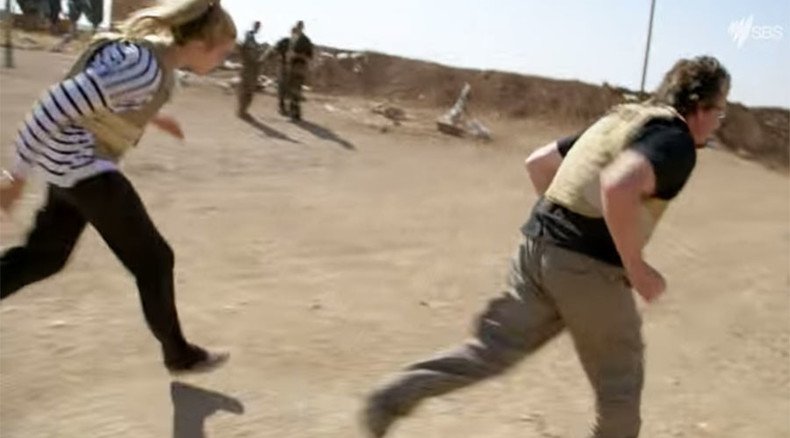ISIS shelled Australian reality TV stars in Syria – video

Participants in an Australian reality TV show were fired on by Islamic State fighters in Syria during filming, public broadcaster SBS’ footage has revealed. The goal of the series is to relive the experience of refugees and show it to Australians first-hand.
SBS aired the first episode of a new season of “Go Back to Where You Came From” on Tuesday evening, a three-part series that takes “ordinary Australians” to Syria, Baghdad and Myanmar, showing what refugees are forced to face every day.
In one of the scenes shown so far, three of the six crew members are running away from shots in Syria, looking for shelter behind walls, as sounds of mortar rounds are heard in the background.
“Righto, that’s rounds coming in. Stay down, Okay,” said the voice guiding the participants. “Stay down, real low. Stay down below this wall. We don’t want them to know we’re here. They’re just in front of us.”
Those involved in the incident were “escorted under security to the Syrian frontlines by Kurdish soldiers as they defend a village under threat by ISIS [Islamic State, previously ISIS/ISIL], and come under fire by nearby ISIS insurgents,” the broadcaster said in its promotional material.
SBS defended the reality show Tuesday, stating that ample security measures were taken when preparing for the series, adding that safety was of “paramount” importance.
However, an Australian security consultant who examined the footage, former army officer Justin Bowden, said there was “substantial risk with the deployment” and “appropriate controls were not implemented,” the Sydney Morning Herald reported.
Bowden concluded in his evaluation that the three participants being shot at should have been equipped with helmets on top of the bullet-proof vests that they were already wearing.
(Video) Avance del reality "Go Back To Where You Came From", grabado en Siria http://t.co/Ecj8AF1SB4pic.twitter.com/2r3jwbBfN1
— El Espectador (@elespectador) July 29, 2015SBS did admit that the incident was not planned, but said the group had the protection of a private security company while traveling through Syria.
“The situation captured on camera where the group were shot at was not planned, but not unexpected in a war zone,” the statement said. “The armed security team were prepared for an event like this, and quickly took action to move the participants and crew to a safer location.”
Not all of the show’s participants embarked on this dangerous mission. One crew member opted out from traveling to the Syrian frontline after a security briefing. A cameraman was also left behind to reduce the number of people participating.
Is your stomach strong enough to handle an asylum seeker journey? #GoBackSBS
https://t.co/vFUrfZgubVpic.twitter.com/EF3AOmv5Xu
— SBS Documentary (@SBSDocumentary) July 20, 2015One of the crew members, anti-refugee campaigner Kim Vuga, who was present during the shooting, described the dangers faced in Syria. “The worst part was going as close as we could and knowing that their bullets could reach us,” she told the Herald. “We were told to listen for any whistling sounds coming through the air and that would mean a mortar had been fired. We were told we had 30 seconds to run 100 meters.”
The idea behind the reality show, which is currently in its third season, is to “put a human face to a pressing global problem,” according to the show’s executive producer, Michael Cordell.
The series won an international Emmy for non-scripted entertainment in 2013. In previous seasons, it took viewers to Afghanistan, Somalia and Indonesia.
The show’s focus on refugees is no coincidence, as the Australian government has cracked down ruthlessly on illegal immigration, creating some of the toughest laws in the world. Australian authorities regularly turn away boats filled with asylum-seekers. The country now resettles only around 6,000 refugees per year under a “humanitarian” visa program.












